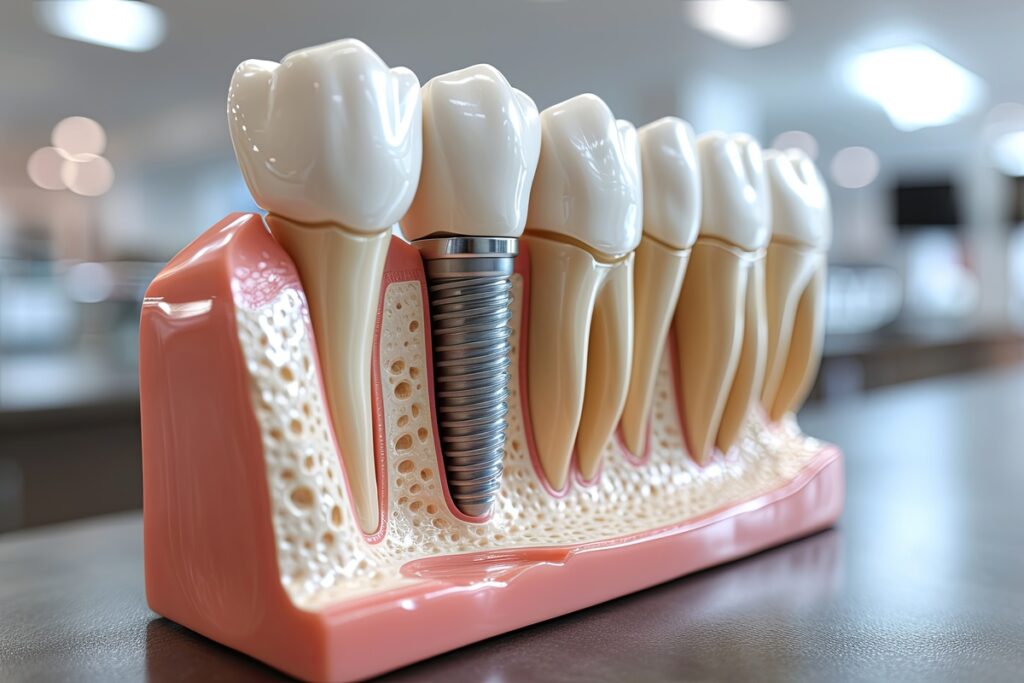
Dental implants are a major investment in your oral health, so it’s essential to take proper care of them to ensure they last as long as possible. While these titanium replacements for your tooth roots demand attention similar to natural teeth, they require specific techniques and precautions, including regular cleaning, professional maintenance, and lifestyle changes, to prevent complications like peri-implantitis and implant failure.
At Middlesex Periodontics & Dental Implants, we provide comprehensive implant care guidance and ongoing maintenance services to help you protect your investment. With over 25 years of experience in implant dentistry, our team follows proven protocols to help patients maintain their dental implants for decades. As a board-certified periodontist, Dr. Daniel Reich combines clinical experience and excellence with the latest research-based techniques to give you the tools and knowledge you need to keep your strong, healthy smile for years to come.
Proper implant care requires a comprehensive approach that addresses daily hygiene, professional maintenance, and lifestyle factors. In fact, research shows that dental implants have a 95% success rate when patients maintain proper oral hygiene and attend regular professional cleanings. This impressive success rate demonstrates the importance of consistent care protocols, including the following:
Proper daily hygiene forms the foundation of implant care. Start with gentle brushing using a soft-bristled toothbrush. Electric toothbrushes with pressure sensors work well for implant patients. Focus on the gum line where the implant crown meets your gums, as this area tends to accumulate bacteria.
Flossing around implants requires special attention. Thread the floss carefully around the implant crown, avoiding aggressive back-and-forth motions that might damage the soft tissue seal around your implant. Water flossers are recommended when patients find traditional flossing difficult.
Regular professional cleanings become even more critical with dental implants. Your hygienist uses specialized instruments designed specifically for implant maintenance, as traditional metal scalers can scratch implant surfaces.
We typically schedule professional implant cleanings every three to four months, which allows for early detection of potential issues and more thorough plaque removal around implant sites.
During these visits, we assess the health of tissues surrounding your implants, check for any signs of inflammation, and measure pocket depths around each implant. These measurements help detect peri-implantitis in its earliest stages, when treatment is most effective.
Understanding potential complications helps you seek treatment promptly when issues arise. Peri-implantitis, the most serious implant complication, develops gradually and requires professional intervention. Watch for persistent bleeding or swelling around implant sites, especially during brushing or flossing. While minor bleeding occasionally occurs, ongoing bleeding suggests inflammation that needs attention.
Changes in how your implant crown feels when biting may indicate loose components or bone loss around the implant. Any mobility in the crown or unusual sounds when chewing require immediate professional assessment.
If you have early-stage inflammation around implants, called peri-implant mucositis, it can be reversible with proper treatment. Professional cleaning combined with improved home care often resolves these issues completely. However, advanced peri-implantitis affects the bone supporting your implant and requires more intensive treatment.
Your daily habits significantly impact implant success. Smoking dramatically increases implant failure risk and impairs healing around implant sites. Tobacco use restricts blood flow to gum tissues, making it harder for your body to maintain healthy conditions around implants.
Teeth grinding or clenching, known as bruxism, can damage both implant crowns and the implants themselves. Night guards protect your investment by distributing forces more evenly across your bite.
Nutrition plays a supporting role in implant health. Calcium and vitamin D help maintain the bone structure that supports your implants. Avoid excessive sugar consumption, which feeds harmful bacteria and increases infection risk.
With the proper maintenance of your dental implants, you’ll enjoy the benefits of your implants for years to come. Regular professional care combined with diligent home hygiene creates the optimal environment for implant success.
Schedule regular evaluations with our experienced implant team to ensure your implants remain healthy and functional. Dr. Daniel Reich’s board-certified training in periodontics and implant dentistry, combined with over 25 years of experience, provides the advanced care your implants deserve. Call us at 732-257-7300 or complete our contact form to discuss your implant maintenance needs and develop a personalized care plan for optimal long-term success.